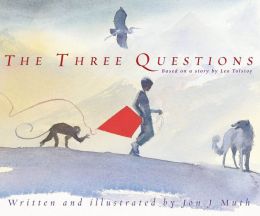I cannot begin to tell you how much we enjoyed this book and the discussion that followed. We used several of the questions from The Center For Philosophy For Children as a springboard:
What do you think of Nikolai’s questions? Do you think they are the most important questions in life?Mane is currently working out her own Three Questions. Last night she was able to articulate one of her own questions and the rationale behind it. I enjoyed seeing the conversation move from Mane simply agreeing with the questions in the book to being able to ask her own questions and think "bigger picture" about them.
Do you believe that what we think about these questions changes over time and with experience? Should it?
Are the most important questions in life the same for everyone?
How do we know the right thing to do when we are faced with a difficult decision?
What does it mean to do the right or wrong thing?
It has been important to establish that I am not interested in "right" answers. I'm interested in where she gets her ideas and how she formulates them. This is different from a lot of parent-child or teacher-child conversations, since often we're asking questions to assess knowledge and correct misconceptions.
Last week we had a conversation about philosophy in general: what it is, what the word means, what philosophers study and what questions they tend to ask. We drew some connections between logic, faith, and philosophy. This week's conversation extended how those things are interrelated. We tend not to be able to answer the Important Questions in life unless we are informed by something. For us, our faith lays a foundation that helps us answer the Big Questions and make meaning out of life.
It has been interesting, also, for me to see how Mane has conceptualized faith up to this point in time, how she views the Bible and our studies of Torah. She has always been a rule-follower, and she talks about right and wrong being about following "the rules." When I inquire about "the rules," she points to scripture. I'm looking forward to investigating with her the nuances of "rules" - the "letter" vs. the "spirit" of rules and laws.



0 comments:
Post a Comment